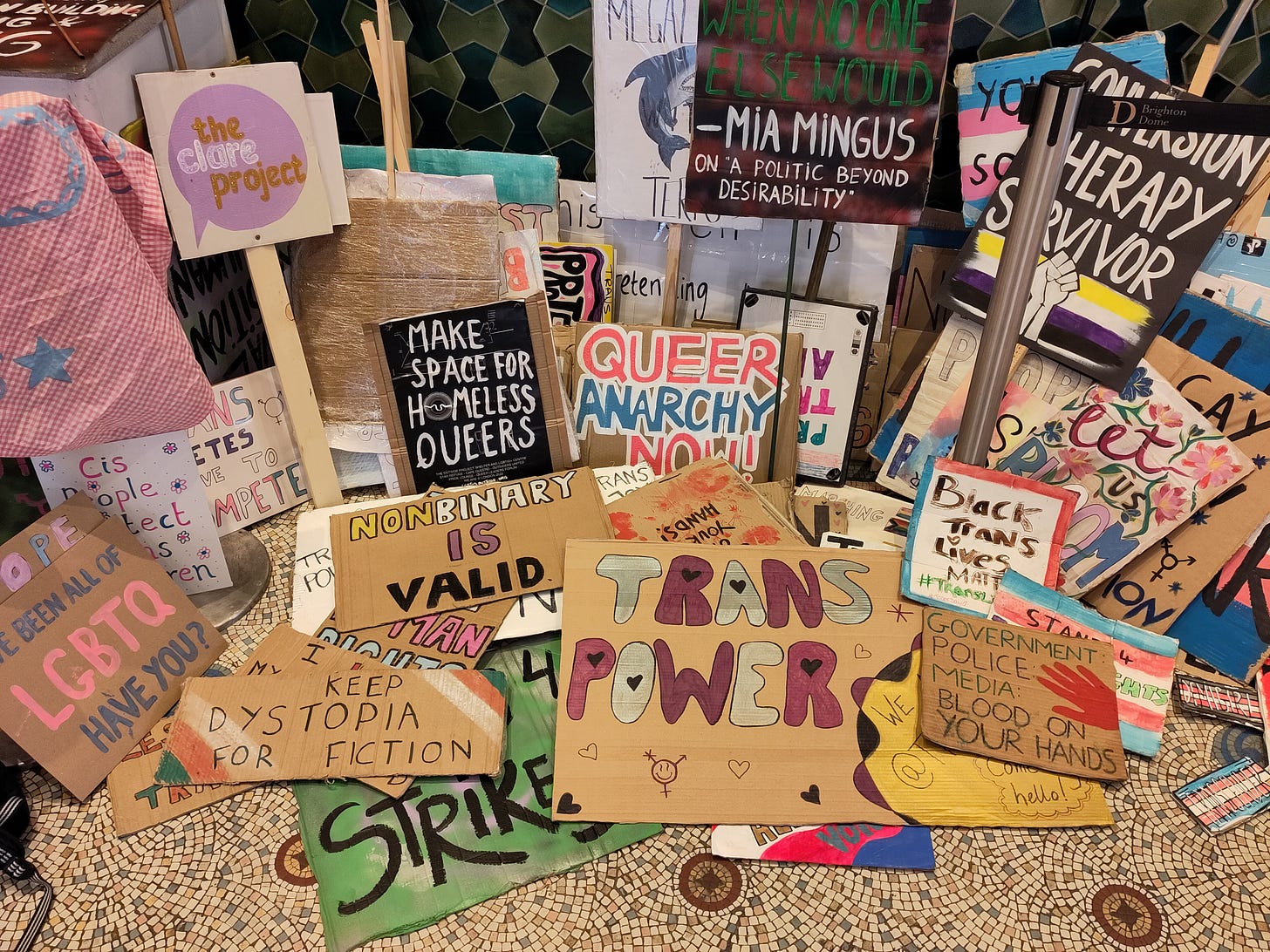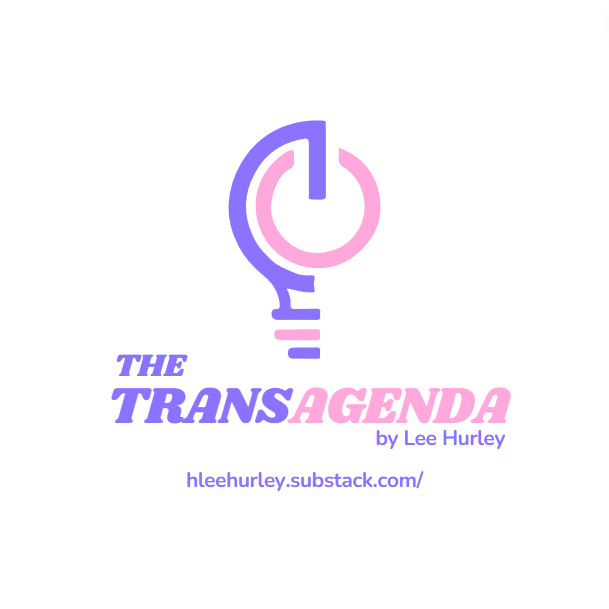TRANS DISCOURSE: THE BEST OF WHAT’S ONLINE
Some of the most important “content creators” who may never appear in print but feel indispensable to the development of trans discourse in the 2020s, whatever else is going on in academia
In my previous post, I presented a primer intended to acquaint readers with some major works of trans theory in print, for educated adults who aren’t necessarily academics. The reality is, though, that trans people have long been under-represented because we are such a tiny minority, comprising around 0.5% of the population. [[1]] Academic discourse by trans writers barely existed before the 21st century.
Just as “literary fiction” by trans people has only started appearing on the lists of major publishing houses in the 2020s – but nuanced representation of trans people could be found in the 1990s, in genre fiction, graphic novels, and comics, with some earlier outliers like Ursula Le Guin – a vastly greater audience is now being reached online by YouTubers, SubStackers, and other bloggers (many trans people being early adopters of the good ole “web log” around the turn of the century, when they realized the newfangled Information Superhighway was also a means to find community across international borders, and access DIY healthcare). Their audiences are in the hundreds of thousands or low millions.
These, then, are some of the most important “content creators” who may never appear in print – or take years to get a book deal that, frankly, might feel like a distraction from their more lucrative day-jobs, rather than the definitive yardstick for cultural achievement, when they do – and the ones who feel genuinely indispensable to the development of trans discourse in the 2020s, whatever else is going on in mainstream academia.
DOC IMPOSSIBLE / STAINED GLASS WOMAN
Having said all of the above, I’m going to start with one of the few writers thoroughly ensconced in academia, being a professor of technical writing at… an American university (which I’ll leave at that because she’s been doxxed more than once). There are several recurring themes in Doc Impossible’s writing and her most important contribution to date may be to pull together research into Complex Post-Traumatic Stress Disorder (CPTSD) at a time when it has yet to be officially recognized in the DSM or have a definitive set of diagnostic criteria but looks set to do so soon, as well as having various strategies for treatment recognized (EMDR and bilateral stimulation being recommended).
It stands to reason that trans people are more susceptible to CPTSD because at the root of the disorder is a prolonged experience of being unable to escape a harmful situation, or a sense of serious threat, with little or no expectation of support, or even being able to tell anyone at all. This is different from the classic cause of PTSD that is a single incident or relatively short / finite period of experiencing harm or the threat thereof, which may therefore have a specific set of triggers that can be avoided or identified and then better managed. The resources offered by Doc Impossible to understand this are second to none for accessibility, clarity, and moving accounts of lived experience, first- and second-hand.
More problematic is the Doc’s theory that Gender Dysphoria is Gender Incongruence + CPTSD. In theory, I could find evidence to fit this from my own life, since I felt GI from the age of 6 but can only say with confidence that it was GD from the onset of puberty around 11 or 12, when I could identify distressing feelings specifically linked to gender rather than a general sense of distress at being in a violent environment hundreds of miles from my parents. That experience, however, could be flipped the other way: my experiences were sufficient to cause CPTSD before the onset of puberty (and there were several signs it had set in) but I lacked the ability to distinguish my feelings about femininity from other feelings of distress until I was old enough and had sufficient knowledge about the lives of girls and women to develop intrusive thoughts about female embodiment.
Nonetheless, Doc Impossible is an unmatched “explainer” of scientific writings on trans identity, the possible aetiology of being trans, the possible pathways for transition, and numerous other issues, as well as writing “meta-discursively” about how to write well and why there are misunderstandings between cis and trans people, among cis people, and so on, and what we can do about it. Her approach is typically “auto-ethnographic” in that she often uses extended personal anecdotes to explain issues as well as hooking the reader emotionally, spreading a beautifully written transition memoir across her many articles. Within her SubStack is a series of excellent pieces titled “So you’ve just learned your partner / colleague / child / etc. is trans,” which repeat a lot of material (for the ease of users) but vary the advice precisely for each audience. Oh, and she’s very gracious when responding to comments from users.
Selected posts:
Remixing Research as a Technical Writer-Advocate for Trans Liberation
Dysfunctional family systems, queer folks, and why the holidays generally suck
A collection of bite-sized educational cards for the cis folks in your life
What you need to know when your teen or adult child got their gender wrong
NATALIE WYNN / CONTRA POINTS
https://www.youtube.com/@ContraPoints
Controversial though she might be among some trans people (let alone the Right-wingers she satirizes and skewers), Natalie Wynn is nonetheless one of the smartest and most entertaining people online and on the Left. Wynn’s targets include populist transphobes and miscellaneous bigots whether in politics, the culture industry, or (populist perversions of) academia (e.g. Jordan Peterson). While her analysis is always smart and informed by a broad range of figures from classical philosophy, post-Enlightenment philosophy, and contemporary thinkers, she wields the big names lightly and deftly, which fits with a highly distinctive style and/or set of personae.
Her main persona is a dark-humoured and mildly irritated intellectual, rolling her eyes at bigotry more than raging at it, but this persona is deliberately undercut by being presented as a borderline alcoholic and occasional drug-user who may get more sozzled as episodes go on, and can’t help but mention various kinks either as a way to mock general perceptions of trans people, the targets of her satire (whom she might call “Daddy” when they are most authoritarian) or to metafictively wink at the camera and keep her viewers alert to irony and subjectivity. Wynn has appeared on a number of prominent Leftwing Youtubers’ channels, boosting her and their visibility (and status) where she consistently explains these as strategies to reach a larger audience who simply wouldn’t enjoy dry academic discourse.
Like Doc Impossible, above, and several other YouTubers, Wynn takes an auto-ethnographic approach, recounting episodes of her life to illustrate how traumatic it can be to grow up in a particular generation, to remain in the closet, and then to navigate different gender roles in sexual and romantic relationships, and in the public eye. More than the Doc, Wynn is candid about how this trauma can underpin (but not completely excuse) problematic behaviour by people like her, as we unpick the effects of our own internalized (trans)misogyny, “compulsory heterosexuality,” etc.
Selected Videos:
Conspiracy. This video discusses misinformation for the purpose of pointing out that it is misinformation. Natalie’s “Citizen Kane” – seriously.
The Witch Trials of J.K. Rowling
Envy
Incels [Fun fact: a pre-transition Abigail Thorn does the voiceover for the incel quotes. LOL.]
KAYLIN HAMILTON / WRITE OR FLIGHT [FKA THE TRANSFEMINOLOGIST]
Despite one of the smallest readerships here (and no current use of YouTube or other streaming services), Dr Hamilton is nonetheless one of the more rigorous and compelling British thinkers on trans issues. Her USP is her experience of living and working as a disabled person in the UK, and hence being part of the “precariat,” which makes her an important voice and while her coverage of the main trans stories of the day doesn’t necessarily differ from many others she always provides essential reading in her longer thought pieces.
Selected Posts:
What Can We Learn From This Queer Couple’s Anti-Nazi Resistance?
How can we resist without the use of identity politics or the politics of victimhood?
The Road to Fascism Is Lined With Liberals Demanding Civility
Liberal civility politics silences the oppressed while giving a megaphone to the fascists
From Famine Walls to Welfare Conditions, Why Do We Always Punish The Poor?
In a little under two centuries, not much has changed in terms of how badly we treat the poor
The UK’s Puberty Blocker Ban is State-Sanctioned Child Abuse
Ban announced despite concerns around suicide risk and criticism of the government’s unethical puberty-blocker trial
ABIGAIL THORN / PHILOSOPHY TUBE
https://www.youtube.com/@PhilosophyTube
As with Natalie Wynn, I’m not going to engage with the controversy that Thorn ripped off Wynn in terms of style and content, before and after her relatively smooth public transition, several years into a career as a YouTuber. Content-wise, Thorn started out with a more conventional approach to making philosophy accessible, gradually weaving in more humour, elaborately costumed characters, and even skits (such as the recurring bourgeois character who complains about The Arsonist in the news while hinting they know the true culprit hiding behind various scapegoats – effectively a satire on how stochastic terrorism is perpetrated by politicians and journalists, who don’t directly harm minorities but create an intellectual climate or mediasphere in which such groups are more likely to be targeted by angry people who feel disenfranchised but unable to vent their ire on those more powerful than themselves).
While Doc Impossible is capable of moving this reader/viewer immensely when speaking from personal experience about transition, and may therefore have more to offer in terms of detail, emotional insight, and hence catharsis, it cannot be denied that it is possible to watch Thorn transition over the months (and, in a sense, years) leading up to her coming out video [
], viewing the gradual introduction of more feminine signifiers, dress, and accessories, as a more or less deliberate subplot to a long series of videos (although small clues actually appear in her first “medium-budget” video shot in the YouTube studios rather than those shot in what appeared to be her living room).
Thorn is fast becoming one of the most famous trans people on the planet (with 1.6 million subscribers), being the first trans actress to appear in a Star Wars spin-off, and in the Game of Thrones prequel, House of the Dragon. As such, her videos have shortened and become less frequent, and have been subjected to more take-downs (mostly from cis-het men) than many of her peers. Again, I have no interest in evaluating their arguments, but would advise viewers treating her as an authority on philosophy to check these dissenting voices, while noting that Thorn is rigorous about sharing her own (lengthy) bibliographies for each episode, and using long quotes that do not seem to be selectively edited to misrepresent specific arguments, even if she may focus more narrowly on the work of each thinker than some critics might like.
Selected Videos:
I Emailed My Doctor 133 Times: The Crisis In the British Healthcare System
Was Nietzsche MAGA?
Who's Afraid of Gender? (A Guide to Judith Butler)
Social Constructs (or, 'What is A Woman, Really?')
DEVON PRICE
[The real one! There are other people using this name…]
As I freely admitted in my previous post, trans men are under-represented in my lists because, hey, I’m trans fem, this isn’t my day-job. I’ll work to remedy this in future but also note that trans men are under-represented anyway.
Dr Price’s USP as a trans person is that he/they may be the most visible detransitioner (and re-transitioner) who isn’t a Right-wing grifter. That’s interesting in itself but his work in print actually focuses on the more “trans adjacent” than “trans specific) issue of burnout which, frankly, we should all be aware of because transition is a massive effort in terms of time spent on life admin, managing our healthcare, self-educating so as to steer professional healthcare providers (who may be ignorant, misinformed, or actively hostile), as well as the daily battle of coping with misgendering, being hypervigilant, educating our peers, rationalizing the ambiguous behaviour of cis people, even before we have to deal with active transpobia, TERFism and so on.
Price is one of the most interesting SubStackers, I’m aware of, on the subject of kink, and why it appeals disproportionately to trans and queer people. TBH, I haven’t read widely (other than what I’ve been pushed by SubStack since reading his work) but it seems the most scholarly and well-written, providing a cogent argument in opposition to the “Staircase Model” and highlighting that kink need not be treated as foreplay or a supplement to vanilla and/or PIV sex but can be an entirely discrete set of activities for those who have no need of these or desire for them.
Selected Posts:
You Might Not Recover from Burnout. Ever.
What grows from the ashes of your old life?
The Quietly Coercive Nature of "Vanilla" Sex
Sex is a buffet of endless, diverse options - and none of them are required.
Is Your Fear of Gender Transition Really the Fear of Aging?
Time & experience change all bodies, including in ways we might dislike.
Supporting the Suicidal No Matter What
Holding body autonomy, dignity, and grief all at once.
JULIA SERANO / SWITCH HITTER
There’s not much to say about Dr Serano – the author of Whipping Girl and hence one of the single most important figures shaping trans discourse in the 21st century – that I didn’t say in my previous post. Her SubStacks are excellent. She doesn’t have a particular shtick other than good, accessible academic writing summarizing the current state of theory, and how we got here, threaded through with her personal experience as someone who transitioned at the turn of the millennium, i.e. well before the Tipping Point in 2013 and the current backlash (post-pandemic).
Selected Posts:
A “Gender Critical” and “TERF” Primer
for readers trying to make sense of “feminists versus transgender activists” debates
Trans People and Sports: Everything You Need to Know
What Is a Woman? (a response)
On “Male Socialization” and the “Trans Masc Versus Trans Fem” Discourse™
THALIA WILLIAMSON
https://substack.com/@thaliawilliamson
It would be reductive to call Williamson the “Devon Price for trans fems” and unfair to both. Williamson is more narrowly focused on kink and is a comparative newcomer to SubStack although her distinct voice suggests she may become one of the more interesting writers, writing from deeply traumatic experiences prior to and during her exploration of kink spaces worldwide.
Selected posts:
Who’s Afraid of Sex? Why No One Understands What Gender Is
And no one ever will
No Cis Person Will Read This Essay
When you say 'cis person,' I hear 'transphobe'
Why Sex Makes me Sick: On the Power of Fantasy and the Fantasy of Power
A lesbian transsexual's musings on sex, desire, and BDSM
A Brief History of my Masochism
On nonconsensual violence, seeing sex workers in Tokyo.
LEE HURLEY / THE TRANS AGENDA
Essentially, Hurley reads all the grim news from the UK so you don’t have to, explains it, and evaluates just how much bias there is in the media across the political spectrum from the Far Right Daily Telegraph (often malicious to a degree that verges on stochastic terrorism) through the more subtle Times (which conceals its agenda through selective reporting) to the Left-wing Guardian (which is muddled in its approach to trans people, offering a mix of occasional positive representation alongside gender-critical voices). Hurley literally quantifies transphobic coverage from week to week, and by comparison with coverage of issues actually affecting more people. That said, his anger towards various writers is often explicit and only offset by the quantitative approach to coverage that some might find a stronger argument.
NB – selecting posts would be redundant because they’re news roundups but this is notable:
HONOURABLE MENTIONS FOR CIS ALLIES
MATT BERNSTEIN / A BIT FRUITY
Bernstein is one of the youngest and most successful YouTubers here, and presents somewhat genderqueer with subtle make-up and a deliciously androgynous voice but make no mistake, the sophistication of his coverage makes him a deserving addition. Bernstein targets many of the same ideologues and issues as Natalie Wynn (above) or Adam Conover (below) but rather than providing satirical dramas to hook the viewer, he uses celebrities (whose lives we can assume to be intrinsically more entertaining and/or known about) as a springboard to talk about more complex issues. LGBT-phobia is a recurring issue, and transphobia within that, with the episode on the “Detransitioner Panic” one of the best, most compassionate approaches to an issue often used to demonize trans people.
Selected Videos:
Transvestigating (with Contrapoints)
The Detransitioner Panic [No trigger warnings. This is heartwarming. It helped me feel better about a friend’s detransition]
Maia Poet: The Final Boss of Detrans Grifters (with Kat Blaque) [TW: this is uglier; this is a very necessary takedown of someone trying to monetize their so-called detransition (from wearing a binder to…not wearing a binder?!) to appeal to the Far Right anti-trans mob]
Surviving AIDS in the 80s
How Conservatism Infiltrated Pop Culture
ADAM CONOVER
Conover is the only cis-het man on this list but that sometimes makes his coverage of trans issues more heartwarming, coming across as sincere allyship founded on years of friendship with trans people in stand-up and entertainment. His interview with Chase Strangio is essential viewing, as is the recent episode featuring three fellow comics discussing what it means to be Trans under Trump.
Selected Videos:
Trump’s Attacks on Trans Rights with Chase Strangio
Trans Comedians Take On Trump's America with Dylan McKeever, River Butcher, and Sammy Mowrey
Joe Rogan & Adam Conover Have In-Depth Discussion About Trans-athletes
How Contrapoints Reinvented Philosophy for YouTube with Natalie Wynn - 267
[1] Transsexuals comprise a fairly consistent 0.5% (or 0.4 – 0.6% in any given society) if we focus on those people who undergo, or strongly wish to undergo, some kind of medical transition, although people who “move away from their AGAB” as Susan Stryker more capaciously describes transgender people may comprise 1-3% in different societies, probably depending on degrees of support, tolerance, or persecution.

















this is great, thank you, will check out the recommended articles. i was surprised to see no mention of talia bhatt, i feel her approach to trans radical feminism is extremely relevant even if she doesn’t have as large a following as some
Wow, thank you so much for the feature Kay! Very weird to see my name alongside all these great people, it a very nice way.